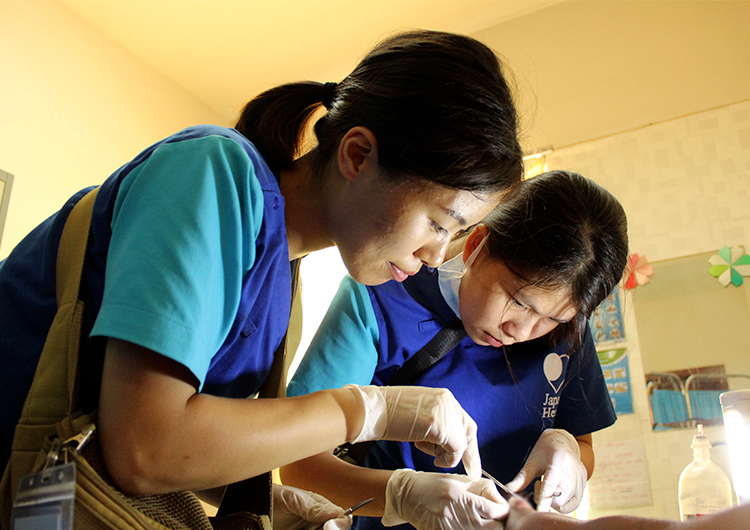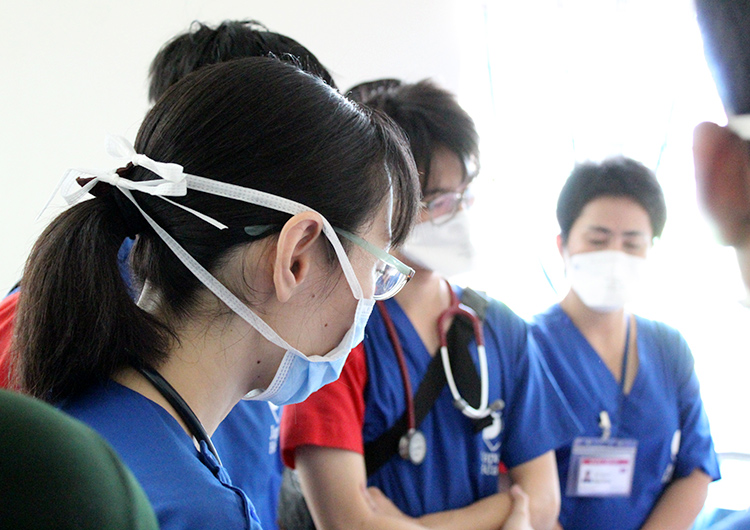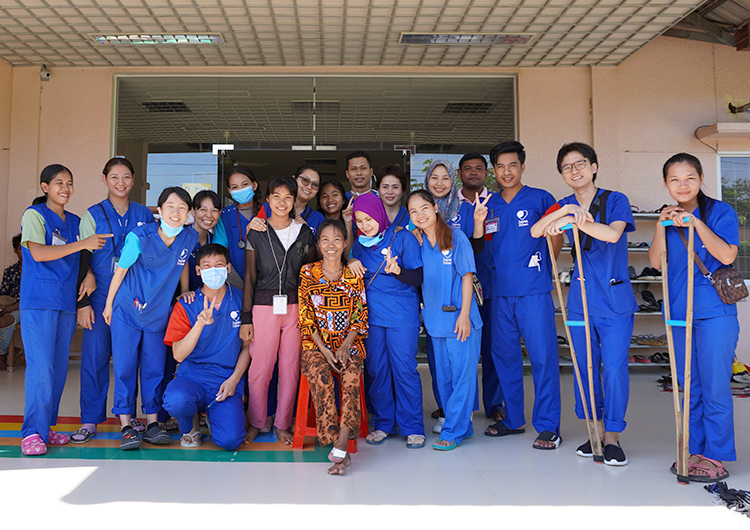In Cambodia, where the quality of medical care is sometimes inadequate and universal healthcare or insurance doesn’t exist for many, patients must struggle to receive the treatments that they choose.
As an example, when a blood transfusion is required, family members and friends of the patient will donate blood at the blood centre and receive blood for a transfusion based on the number of people who donated. You can imagine the process of gathering everyone and rearranging schedules to make sure everyone can make it to Phnom Penh. Simply put, if you can’t afford your medicine, you won’t get it.
Under these kinds of situations in Cambodia, there are patients whose will to survive is stronger than the barriers that may be in front of them.
One such patient is a woman in her 40’s who was accompanied to the hospital by her daughter, a junior high school aged girl with a lovely smile. The patient had necrotic toes and diabetes, and her treatment was on track with daily wound care and blood sugar control.

However, strong treatments to lower a high blood sugar level may be too effective and result in hypoglycaemia. When there aren’t adequate drugs and supplies, there is an air of nervousness around the treatment. To complicate matters, as we adjusted the patient’s blood sugar levels, the wounds on her toes didn’t improve. The possibility of the infection spreading to the rest of the body was too high and we tell any patient in this situation the same thing.
“I think we need to amputate your toes.”
Normally, when this news is conveyed to a patient, they need time to return their final decision. It is understandable when you are about to lose a piece of yourself forever.
But this mum’s decision was immediate.
“Yes.”
This was the first time that someone had answered so quickly to the prospect of having a body part amputated. I didn’t ask the mother why, but perhaps she felt that even if she lost some of her physical freedom, she had to live for her family. The smiling girl beside me made me think so.
Upon hearing the news of her decision, we all started preparing immediately. Due to travel restrictions imposed by the coronavirus pandemic, there weren’t any surgeons in the hospital who could operate on her foot. In consultation with another NGO’s hospital, we managed to arrange surgery for free, but hospitalisation would be $20 per day. Travel was arranged to be cost free as well. In the blink of an eye, the transfer and surgery were decided.
In the morning when the patient was taking the ambulance, I wanted to tell her to come back to our hospital after she recovers from her operation, so I called out to an experienced Cambodian nurse for interpretation.
The experienced nurse replied to me. “I have already told her. I also thought it would be better for the patient to come back”
She deeply understands the patient’s physical, mental and financial issues. That’s why she could give the most suitable suggestion for the patient.
What really surprised me though, was that the mom, who after being transferred to the hospital for her amputation in the morning, arrived back to our hospital by tuk-tuk at 2pm the same day. The Cambodian staff were also surprised by this. The surgery was free, but there were hospital charges so it is good that she came back to receive treatment at our hospital.
It crossed everyone’s mind that if her wound infection cannot be controlled, more foot will have to be amputated and we will have to continue treatment.

It wasn’t just medical staff who were involved in her recovery. The patient didn’t have money to buy crutches, so her father made a set out of a piece of bamboo in just one day. To make sure that the crutches were safe to use on the slippery hospital floor, a Cambodian hospital staff member attached spare rubber tubes to the bottoms. Cleaning staff also made time to talk to the patient while she recovered. After about two months of treatment, she was well enough to be discharged. The patient, who at the beginning of her treatment had such a hard facial expression, finally returned home with a lovely smile.
When I think back, I believe that the strong will to live, which led the mum to quickly put her life in our hands, and the involvement of everyone, led to her recovery.
Cambodian people rely on their families for help more than in Japan and I cherish the existence of my family. This is why I believe it is important to return patients home in a better condition than when they came to the hospital. It is easy to say, but in order to realise it here in Cambodia, careful preparation and implementation are required. I also think that conviction is necessary too. I myself easily get particularly unfocused. So, if I do not keep an ear to the ground and put myself under strain, important things easily get stuck.
This time, I was able to realise many things from this mum’s strong will to live. This mother’s recovery was a joyous learning experience for everyone who took care of her.
I would like to thank her from the bottom of my heart and I will strive to become a small force for as many patients as possible.

Head Nurse Reina Fukuda, Japan Heart Children’s Medical Center

